Hair loss isn’t something that only happens to men. Approximately 55 percent of women experience hair loss. According to statistics by the American Hair Loss Association, 40 percent of all hair loss suffers are women. It often begins slowly and can escalate, depending on the underlying cause.
Female Pattern Baldness
It’s an inherited condition that often takes women by surprise. Women with a female relative that has the condition are more prone to developing the condition. It typically follows a predictable pattern that includes thinning along the crown and a receding hairline.
Hormonal Changes
Menopause is the primary cause of serious hair loss as women age and estrogen levels decrease. The amount of hair loss varies, depending on the individual. Its most prevalent in women over 50 years of age and those with an increased body mass index. However, temporary hair loss can also occur due to pregnancy and childbirth.
Medical Conditions
Alopecia is an autoimmune disease in which the immune system attacks the hair follicles. The disease is common in those with diabetes, rheumatoid arthritis, lupus, thyroid disorders, anemia, and psoriasis. The amount and size of the bald areas vary depending on the individual and some women lose all their hair.
Medications
Prescription medications treat a variety of health conditions, but they can also result in hair loss as an unpleasant side effect. Medications used to treat depression, arthritis, gout, high blood pressure, thyroid disease, and heart problems can cause ongoing hair loss. Beta blockers, blood thinners, steroids and anti-inflammatory drugs can also cause hair loss. Chemotherapy and radiation therapy to treat cancer are well-known causes of baldness, but hair usually grows back.
Hairstyles
Traction alopecia is a type of hair loss resulting from excessive styling and hairstyles that pull the hair tight such as ponytails, pigtails and cornrows. Perms and hot oil treatments are popular, but can also cause permanent hair loss if scarring occurs.
Hair Transplant Of Florida
Our Florida Hair Transplant Centers pride themselves on providing the most advanced hair transplant in Florida. Dr. Kristopher Hamwi, Clinician Sia Gieger, and Clinician Rhonda Daniels are all specialists in the field of hair restoration., Rest assured that your balding hair is in good hands.
To schedule your hair transplant/hair restoration appointment at one of our South Florida Centers please contact us at (941) 315-7033

